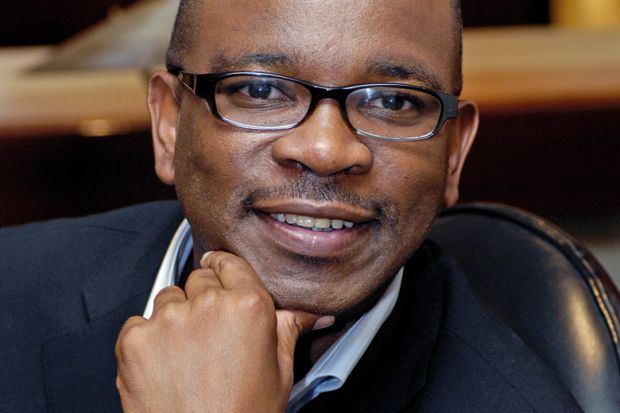“It tells me I’m on the right path when the conservatives say I’m radical and the students say I’m a sell-out,” reflects Xolela Mangcu, professor of sociology at the University of Cape Town.
A leading public intellectual and newspaper columnist, he is also the author of Biko: A Life, a biography of Steve Biko, the anti-apartheid activist and founder of the Black Consciousness Movement, who died in police custody in 1977.
He is now working on a biography of Nelson Mandela, the first by a black South African, and is spending four months in the UK as the Emeka Anyaoku chair in Commonwealth studies at the University of London’s School of Advanced Study, looking at the archives illuminating Mandela’s upbringing in the Transkei.
Professor Mangcu was once highly critical of Mandela for “avoiding the tough questions about race on the grounds that we were now in a post-apartheid society and therefore beyond race”. But he now sees him more as “a tragic figure who had to sublimate his own beliefs. Biography helps you understand politics in a way that political theory doesn’t.”
How race plays out in the new South Africa is also highly relevant to what is happening in universities.
The academy, notes Professor Mangcu, is “still woefully, woefully white in the make-up of the professoriate – there are only five or six full black professors at Cape Town out of more than 200”. In a recent article on “Decolonizing South African sociology: building on a shared ‘text of blackness’”, he described a decision by universities to “privilege economic over racial analysis” in access initiatives partly on the grounds that “race is an unscientific concept that takes South Africa back to apartheid-era thinking”.
Yet what this demonstrates, in Professor Mangcu’s view, is that “white South Africans know very little about black South Africans, their languages, their culture. Race has always been understood as a political and not just a biological concept. They don’t know that. They assume we are talking about an unscientific concept. I have to educate my fellow academics.”
Meanwhile, a whole tradition of black intellectual writing in South Africa, going back to the 1830s, is still largely neglected, he believes. Changes since the end of apartheid, notes Professor Mangcu, “mean that we have introduced Michel Foucault on to the syllabus but not dug into the history of those black intellectuals. The books are there. I say to colleagues: why are you not introducing them into the syllabus? But it’s not what they know, or are willing to invest their time in knowing. They fear new syllabuses would make them redundant or think such writers have nothing to offer.
“In the United States, we had similar debates in the 1960s and early 1970s and I’ve been telling my colleagues in South Africa that universities responded by founding all these African studies departments at the best universities. The universities responded to these debates by institutionalising them. I’m surprised in South Africa we don’t see in this clamour from young people the opportunity to create something new.”
Such new syllabuses, Professor Mangcu hopes, would help give young black South Africans “a sense of pride and knowledge in where they come from, but also critical tools of analysis”, while also helping white South Africans “relate to black people in a cultural, historical, intellectual sense that would then begin to provide what Steve Biko called the ‘joint culture’”.
But despite such arguments having proved too radical for some of his conservative colleagues, Professor Mangcu has also fallen foul of his more radical students.
On one occasion, he was hosting a panel discussion at the University of the Western Cape featuring a number of participants from the University of California, Berkeley, including the philosopher Judith Butler. A group of students who identified as Pan-Africanists, he recalls, “basically came and disrupted the proceedings. The irony was that the white professors were saying exactly what they were calling for. Butler was talking against the commercialisation of universities, and why universities need to be public. But they couldn’t see beyond the whiteness of the people.
“In my understanding of black consciousness, it was never about that. It isn’t that you dismiss someone even before you hear what they are saying. These students objected because I was acting like a gamekeeper and protecting the white professors. But they were there as our guests and I was duty-bound to defend them.”
后记
Print headline: ‘We have not dug into the history of black intellectuals’




